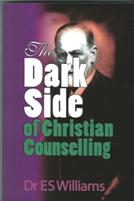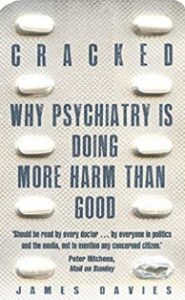The Biblical View of Depression
In the article on Psycho-secular Depression, we saw that the psycho-secular disease model of depression, developed by the DSM of the American Psychiatric Association, is now widely accepted by many Christians. There is no doubt that the Christian counselling movement has succeeded in inculcating the psycho-secular view of depression right into the heart of the Christian church. 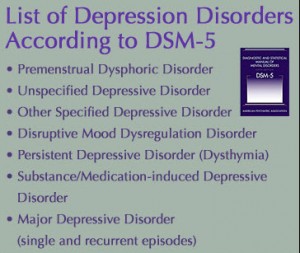 This is why books on how to overcome depression are bestsellers, and why depression seminars and counsellors are part of the ministry of many churches.
This is why books on how to overcome depression are bestsellers, and why depression seminars and counsellors are part of the ministry of many churches.
Christians who accept the view of depression developed by the world of psychiatry often turn to Scripture to justify their position, as we saw in the previous chapter. We are told that as great men of God showed signs of depression (Elijah, Job, Moses, Jonah and Jeremiah being quoted as examples), it is only to be expected that ordinary Christians will suffer in the same way. The inference is that the psycho-secular view of depression is supported by Scripture.
As a consequence there is now confusion around the issue of depression in the churches. Why are there so many supposedly depressed people needing counselling or other treatment in church congregations? Are they all really suffering with a mental illness? Or should we distinguish more clearly between truly serious depression and simply feeling low? Many sense that it cannot be right for so many Christians to be receiving psychotherapy from secular therapists to help them deal with problems of daily living, and some question whether Christians need antidepressant drugs to help them overcome their depressed feelings. After all, Scripture promises that God’s divine power has given us all things that pertain to life and godliness through the knowledge of Christ (2 Peter 1.3). Adding to the confusion is the fact that the word ‘depression’ is used nowadays to describe a wide range of emotional responses.
To understand the issue of depression and to overcome our confusion we must start with Scripture, and not with the ideas that come from the DSM. Scripture is profitable for instruction in righteous living ‘that the man of God may be complete, thoroughly equipped for every good work’ (2 Timothy 3.16-17). A theme that runs through the Bible is that God’s servants are often downcast and in deep despair. When Jacob was told that his son Joseph had been devoured by a wild beast he refused to be comforted and said, ‘I shall go down into the grave to my son in mourning’ (Genesis 37.35). Scripture shows that Jacob was deeply depressed by the loss of his son. Clearly the Bible has a lot to say on the subject. So let us clear our minds of the presuppositions that come from the flawed psycho-secular approach to depression and turn to God’s Word with an eager, expectant mind. Let us search the Scriptures to understand what the Bible has to say about ‘depression’.
The depression of King David
In the Psalms, King David gives full vent to his episodes of depression. In Psalm 13 David describes the daily sorrow in his heart because he feels forgotten by God. ‘How long, O Lord? Will You forget me forever? How long will You hide Your face from me? How long shall I take counsel in my soul, having sorrow in my heart daily?’ (Psalm 13.1-2). The pain in David’s heart comes from a sense that God has forgotten him. He feels that he is walking in darkness, distant from God, and this is the cause of his ongoing despair. Matthew Henry explains, ‘God sometimes hides his face, and leaves his own children in the dark concerning their interest in him: and this they lay to heart more than any outward trouble whatever.’ David’s response to his downcast feelings is to trust in God’s mercy, and to rejoice in God’s salvation (v5).
In Psalm 31 King David expresses his profound grief as a result of the slander of his enemies and schemes against his life and because of his own sin. ‘Have mercy on me, O Lord, for I am in trouble; my eye wastes away with grief, yes, my soul and my body! For my life is spent with grief, and my years with sighing; my strength fails because of my iniquity, and my bones waste away . . . I am forgotten like a dead man, out of mind; I am like a broken vessel’ (Psalm 31.9-10, 12). David is a man in distress and trouble. And his great concern is about his soul. His response is to affirm his trust in God. And he gives this encouragement to those who are downcast, ‘Be of good courage, and He shall strengthen your heart, all you who hope in the Lord’ (Psalm 31.24).
David describes his deep despair when betrayed by his friend and counsellor Ahithophel. ‘My heart is severely pained within me, and the terrors of death have fallen upon me. Fearfulness and trembling have come upon me, and horror has overwhelmed me’ (Psalm 55.4-5). In his deep despondency David longs for wings like a dove to fly from his torment – the realisation that it is his friend who has betrayed him. Then he comes to his senses and calls upon God. ‘And the Lord shall save me. Evening and morning and at noon I will pray, and cry aloud, and He shall hear my voice . . . Cast your burden on the Lord, and He shall sustain you; He shall never permit the righteous to be moved’ (Psalm 55.16-17, 22).
Psalm 38 is a prayer for deliverance from God’s chastening for his sins. ‘I am troubled, I am bowed down greatly; I go mourning all the day long. For my loins are full of inflammation, and there is no soundness in my flesh. I am feeble and severely broken; I groan because of the turmoil of my heart . . . For I am ready to fall, and my sorrow is continually before me. For I will declare my iniquity; I will be in anguish over my sin’ (Psalm 38.6-8, 17-18). Scripture is up-front that David’s turmoil of heart, his continuous sorrow and anguish, is here caused by his iniquity and sin.
King David despised the commandment of the Lord when he committed adultery with Bathsheba and murdered Uriah her husband.  His sin had the most severe spiritual consequences – he lost the joy of salvation, he no longer knew God’s presence, his sin was always before him, he had a guilty conscience and a broken heart. David describes his despair in Psalm 51 as he confesses his terrible sin to God – ‘against You, You only, have I sinned’ – and prays that God would wash him clean and deliver him from the guilt of bloodshed. ‘Make me hear joy and gladness, that the bones You have broken may rejoice . . . Restore to me the joy of Your salvation’ (Psalm 51.8, 12). Here we have a clear example of the consequences of sin in the life of a believer. We also have the answer to despair caused by sin – confession and repentance.
His sin had the most severe spiritual consequences – he lost the joy of salvation, he no longer knew God’s presence, his sin was always before him, he had a guilty conscience and a broken heart. David describes his despair in Psalm 51 as he confesses his terrible sin to God – ‘against You, You only, have I sinned’ – and prays that God would wash him clean and deliver him from the guilt of bloodshed. ‘Make me hear joy and gladness, that the bones You have broken may rejoice . . . Restore to me the joy of Your salvation’ (Psalm 51.8, 12). Here we have a clear example of the consequences of sin in the life of a believer. We also have the answer to despair caused by sin – confession and repentance.
Those who accept the psycho-secular approach would say that David’s symptoms were consistent with a diagnosis of clinical depression. But Scripture shows that David’s downcast feelings were a spiritual condition – he was not suffering from a mental illness or a chemical disorder of the brain. In Psalm 13 the daily sorrow in his heart was caused by the feeling that God had forgotten him; he felt that he was walking in darkness. In Psalm 55 his severely pained heart, his fearfulness and trembling, was caused by difficult, adverse circumstances. In Psalms 38 and 51 David makes it clear that he was greatly cast down because of his sin – ‘my sorrow is continually before me. For I will declare my iniquity; I will be in anguish over my sin.’ In Psalm 31 David wasted away with grief because of both adverse circumstances and sin. Clearly, the biblical picture of ‘depression’ is very different from that described by the DSM. We are, in fact, dealing with two different, and fundamentally opposed, views of human emotions.
The psycho-secular view of depression is based on the DSM, a manual rooted in secular humanism, but regarded by many as the ‘bible’ of psychiatry. Psycho-secular depression denies the spiritual dimension of man and rejects the doctrine of original sin. According to this view, man is an evolved animal without a spiritual dimension to his life. Depression is often due to a mysterious chemical imbalance that produces a disorder of the brain that results in mental illness. The biblical view of depression flows out of the fact that man is a living soul created in the image of God and accountable for his actions. All are sinners by nature and sin has consequences that affect our behaviour, thoughts and emotions. King David experienced sorrow and despair because of adverse circumstances and sin. God also allowed him to walk in darkness to test and strengthen his faith.
While Scripture has much to say on the subject of ‘depression’ it does not use the term. Instead it uses various phrases, such as a downcast soul, deeply distressed, walking in darkness, a sorrowful spirit, a grieving heart, bitterness of soul, all these terms describing the suffering of a depressed soul. Moreover, Scripture and the DSM have different views of the causes of depression, as we have already seen, and the response of men of God such as David, Job and Jeremiah, is fundamentally different from the response advocated by the DSM. So the only similarity between a psycho-secular view of depression and the biblical view of depression is that both involve the same type of symptoms. We are, in fact, dealing with two fundamentally opposed views of depression, founded in fundamentally opposed worldviews. The battle over the interpretation of depression is, ultimately, a spiritual battle between the forces of secular humanism and the truth of God’s Word.
In order to distinguish between two fundamentally opposed views of depression, we need to use terminology that makes the distinction clear. To use the same term, ‘depression’, to describe two entirely different and opposing concepts is a recipe for muddled thinking. There is no doubt that the all-embracing term ‘depression’ has led to a great deal of confusion, for it is being interpreted in different ways and means different things to different people. Moreover, there is always the spectre of mental illness lurking around the term ‘depression’. Here it is important to point out that while a small proportion of patients with serious symptoms of depression have a genuine mental illness and may benefit from medical treatment, the vast majority are not mentally ill.
To distinguish between the two opposing views we use the term psycho-secular depression to describe the model constructed by the DSM, and terms used in the Bible, namely, downcast soul, deep despair or walking in darkness, to describe the biblical view. (The Puritans used the term melancholia.)
The emotional nature of man
Scripture teaches that the eternal God, revealed in the incarnate Christ, has an emotional aspect to his character. The Lord Jesus exhibited the full range of human emotions, although without sin. He was joyful, he wept over Jerusalem, he was greatly troubled by the death of Lazarus, he loved the rich young man, and he was angry and grieved at the hardness of heart of the Pharisees. In the Garden of Gethsemane he was troubled; his soul was exceedingly sorrowful and deeply distressed (Mark 14.33, 34). Scripture teaches that man, created in the image of God, is a living soul with the ability to experience and express a range of emotions. In The Origin of Man, Stuart Burgess explains that our uniquely created facial muscles allow us to express emotions such as happiness, disapproval, confusion, grief, anger, pain, surprise and boredom. The ability to cry is a uniquely human attribute from a Creator who has created man in such a way that he is able to express his emotional feelings.1
The effect of the Fall on human emotions
In their state of innocence in the Garden of Eden, Adam and Eve were perfectly content for they knew the joy of communion with God. When Adam and Eve sinned they became separated from the presence of God. Their emotional life was seriously impaired, for they felt afraid, ashamed and guilty. Their relationship became troubled as Adam blamed his wife for their condition. Life outside Eden, banished from God’s presence, was difficult, frustrating, painful and sorrowful. Men would tend to rule over women. Brothers would be filled with envy, anger and hatred – such as downcast Cain who killed his brother Abel. The Fall had a catastrophic effect on the human condition. From henceforth all people would experience physical and emotional suffering. All men, because of their sinful nature, are subject to trouble, despair, despondency and sadness. Men and women needed to be saved from their slavery to sin.
Adam and Eve, had they filled in a screening questionnaire, would undoubtedly have been diagnosed as suffering with clinical depression by today’s mental health industry, for they had deep feelings of sadness and a very marked loss of pleasure as they hid from the presence of God among the trees of the Garden, filled with fear, guilt and shame. A psychotherapist would have confirmed the diagnosis and prescribed a course of cognitive therapy. But Scripture makes it clear that their wretched condition, their downcast soul, was caused by their separation from God. They needed a Saviour, not a therapist.
A psychotherapist would have confirmed the diagnosis and prescribed a course of cognitive therapy. But Scripture makes it clear that their wretched condition, their downcast soul, was caused by their separation from God. They needed a Saviour, not a therapist.
To understand the deep-seated nature of mankind’s problem we must see it in the context of the Fall. In his volume of systematic theology Robert Reymond explains, ‘Every part of his being – his mind, his will, his emotions, his affections, his conscience, his body – has been affected by sin (this is what is meant by the doctrine of total depravity). His understanding is darkened, his mind is at enmity with God, his will to act is slave to this darkened understanding and rebellious mind, his heart is corrupt, his emotions are perverted [my italics], his affections naturally gravitate to that which is evil and ungodly, his conscience is untrustworthy and his body is subject to mortality.’2 He is spiritually dead and his body is subject to disease and decay.
The Fall has also affected the world in which man lives. The creation is subject to futility and the bondage of corruption. ‘For we know that the whole creation groans and labours with birth pangs together until now’ (Romans 8.22). The ground is cursed and brings forth thorns and thistles.
The life of man is governed by sweat and toil. Even Christians, who have the indwelling Spirit, groan within themselves as they wait for the redemption of their bodies (Romans 8.23). We experience the sorrow of living each day with the burden of the world, our flesh, and our mind that so easily leads us into sins we have no desire to commit. ‘But what I hate, that I do . . . O wretched man that I am! Who will deliver me from this body of death?’ (Romans 7.15, 24). Our bodies are part of creation and participate in all the futility and corruption to which creation has been subjected. In this life, this side of Heaven, there are days of trouble and difficulty. ‘Man who is born of woman is of few days and full of trouble’ (Job 14.1). Moreover, the Lord Jesus warned that the life of a disciple is subject to persecution. He said plainly that ‘in the world you will have tribulation’ (John 16.33).
As a consequence of the Fall the human mind is troubled and unable to find rest and contentment. There are many hardships, for life in a fallen world, governed by sin and corruption is full of frustration and strife. The spirit of man is subject to continuing unease with the way things are; persistent feelings that the world is not quite right, that it is a place of suffering, foolishness, and evil. Despair and sadness may sometimes be the lot of a Christian who grows weary of the constant spiritual battle ‘against the rulers of the darkness of this age, against spiritual hosts of wickedness in the heavenly places’ (Ephesians 6.12).
Diseases of the brain and mental illness
Another consequence of the Fall is that man’s body is subject to disease and decay. We see this in organic diseases of the brain such as epilepsy, Parkinson’s disease, brain tumours and dementia. But what about mental disorders created by the DSM, such as depression and conduct disorder, which have no organic pathology? As we saw in chapter 2, there is no objective test to confirm the diagnosis of clinical depression. Because the subjective data gathered from the patient is inherently unreliable, it is difficult for the clinician to be certain that the symptoms are caused by a mental disease. A report of the USA Surgeon General acknowledges the difficulty in diagnosing depression.
He makes the point that for ‘mental disorders such as depression, the signs and symptoms exist on a continuum and there is no bright line separating health from illness, distress from disease’.3
Scripture confirms the difficulty in diagnosing mental illness. When David fled before Saul he ended up in Gath. He was very much afraid of King Achish, ‘so he changed his behaviour before them, pretended madness in their hands, scratched on the doors of the gate, and let his saliva fall down on his beard’ (1 Samuel 21.13). David’s pretence of insanity was so convincing that the king and his servants were completely deceived. King Achish said to his servants, ‘Have I need of madmen, that you have brought this fellow to play the madman in my presence?’ (v15). Clearly it is possible for a person to feign mental illness for his own purposes.
While recognising the diagnostic difficulties, it is important to again state that a small group of people with the most severe symptoms of depression are likely to benefit from medical treatment. Some people may also experience alarming symptoms such as hallucinations and delusions, even endangering their own lives or those of others, and these require medical attention. Hallucinations occur when an individual experiences a sensory impression that has no basis in reality. A delusion is a false belief that an individual holds despite evidence to the contrary. A common example is paranoia, in which a person has delusional beliefs that others are trying to harm him. Attempts to persuade the person that these beliefs are unfounded typically fail and may even result in the further entrenchment of the delusional beliefs.4
According to the report of the Surgeon General, patients with psychotic disorders such as schizophrenia frequently have marked disturbances in the logical process of their thoughts. ‘Specifically, psychotic thought processes are characteristically loose, disorganised, illogical, or bizarre. These disturbances in thought process frequently produce observable patterns of behaviour that are also disorganised and bizarre. The severe disturbances of thought content and process that comprise the positive symptoms often are the most recognisable and striking features of psychotic disorders such as schizophrenia or manic depressive illness.’5
Undoubtedly the small proportion of depressed people who exhibit the symptoms mentioned above have a genuine need for medical treatment. But we need to keep the issue in perspective, for the vast majority of people who are given a label of clinical depression by the counselling industry are not in need of medical treatment. We can be confident that the claim of the counselling world that ten per cent of the population, each year, suffer with clinical depression is false – there is no doubt that the condition is being massively over diagnosed.
Examples from Scripture of a downcast soul
There are many examples in Scripture of men and women who experienced deep despair, misery, sadness, despondency and a downcast soul, symptoms that would today be wrongly diagnosed as depressive illness – what we are calling psycho-secular depression. From Scripture we can identify three broad groups of people who suffered from these symptoms. The first are those downcast because of adverse circumstances, such as those experienced by Job and Hannah. The second are those who walk in darkness or gloom as a result of living in a fallen world. The third are in deep despair because of their personal sin, such as King Saul and Cain. However, these are broad categories with considerable overlap, for all people are subject to the consequences of living in a fallen world. Adverse circumstances and sin often go together. Nevertheless, to think about the causes of spiritual and emotional suffering in these groups will help our understanding.
Here we should remind ourselves yet again of the difference between psycho-secular depression and the biblical view of a downcast soul. Psycho-secular depression is the brainchild of psychiatry. It denies the spiritual nature of man; it denies the reality and consequences of the Fall; it treats depression with psychotherapy and drugs. The biblical concept of a downcast soul, by contrast, accepts the spiritual nature of man. It recognises the effect of the spiritual Fall, and the oppressive consequences of sin. The answer to a downcast soul is always found in the Word of God. While the two views have a common understanding of the symptoms of ‘depression’, they differ radically in their understanding of the causes and the response to these symptoms.
(1) A soul downcast by adverse circumstances
(a) The apostle Paul burdened beyond measure
In his Second Letter to the Corinthians Paul describes his suffering in the cause of Christ, there being 30 references to the despair that the great apostle endured in the name of Christ. The apostle wants the Corinthian church to know of the great hardship he suffered during his missionary journey in Asia. Such were the sufferings and troubles of Paul and his companions that they ‘were burdened beyond measure, above strength, so that we despaired even of life’ (2 Corinthians 1.8). But God allowed this to happen, according to Paul, ‘that we should not trust in ourselves but in God who raises the dead’ (2 Corinthians 1.9). The message is that during times of profound suffering and difficulty we should trust in God.
Paul refers to his ‘anguish of heart’ and ‘many tears’ (2 Corinthians 2.4) in dealing with the Corinthian church. When they arrived in Macedonia they were downcast because ‘our bodies had no rest, but we were troubled on every side. Outside were conflicts, inside were fears. Nevertheless God, who comforts the downcast, comforted us by the coming of Titus’ (2 Corinthians 7.5-6). Paul gives a detailed list of what he suffered for the sake of Christ. He was often whipped and beaten with rods; he was stoned and shipwrecked; he was frequently in perils from robbers, from false brethren, from Gentiles and even his own countrymen. He suffered weariness and toil, sleeplessness, hunger and thirst, cold and nakedness, besides the other troubles that came upon him daily (2 Corinthians 11.24-28). Paul is making it clear that hardship and suffering, both emotional and physical, are a part of the Christian life.
God had allowed Paul to have a thorn in his flesh. And when Paul asked God to remove the thorn, God said, ‘My grace is sufficient for you, for My strength is made perfect in weakness’ (2 Corinthians 12.9). With this promise from God, Paul could take pleasure in infirmities, in reproaches, in needs, in persecutions, in distresses, for Christ’s sake. Paul’s response was to place his trust in the God of all comfort, for he had learned to be content whatever his circumstances. He knew that God’s grace was sufficient.
In his book, Pain of Mind: A Biblical Perspective of Depression, Dr Earl Cooper concludes that in the second letter to the Corinthian church Paul wraps up emotional despondency, extreme burdens, and intolerable affliction in one bundle and designates it suffering. ‘It is to this end that the epistle offers such practical insight to the suffering believer, whether suffering from physical illness or the stress of circumstances or from the emotional upheaval, Paul’s view of suffering lays down a biblical foundation for victory.’6 Cooper explains that Paul relates his personal struggle, including emotional despondency, in terms of the importance of prayer, dependence upon God, and the sufficiency of God. ‘His proper handling of life’s difficulties was not release from suffering, but strength from God in suffering. Paul’s acceptance of suffering and weakness, indeed, his welcoming of such for the sake of the glory of God, flies in the face of today’s fretful saints. All believers, whether undergoing stressful circumstances, physical affliction, or emotional despondency, would benefit from a closer look at the theology of suffering.’7
Paul not only accepted suffering as a part of serving Christ, he viewed it as a privilege to suffer for his Lord. He wanted to know Christ, and to share in the fellowship of his sufferings (Philippians 3.10). It is interesting that the Christian counselling movement never uses Paul as an example of a depressed Christian, although in his letters he frequently mentioned the despair and anguish that he suffered for the sake of the Gospel. Paul’s witness is a model of how a true believer responds to a soul downcast by adverse circumstances.
(b) Hannah’s sorrow of spirit
Childless Hannah was severely provoked by her rival Peninnah, who had many children by Elkanah, their husband. Scripture describes Hannah’s mental turmoil in careful detail in the first chapter of 1 Samuel. ‘And her rival also provoked her severely, to make her miserable, because the Lord had closed her womb’ (1 Samuel 1.6). In her despair Hannah wept and did not eat (v7), and such was her sadness that her husband asked why her heart was grieved (v8). In bitterness of soul she prayed to the Lord and wept in anguish (v10). 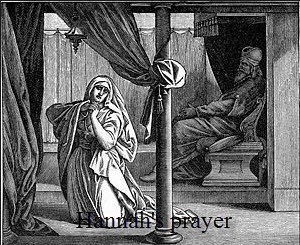 When she was confronted by Eli, and accused of being drunk, she answered, ‘No, my lord, I am a woman of sorrowful spirit’ (v15). When Eli assured her that the God of Israel would grant her petition, she went her way and ate and her face was no longer sad (vv17, 18).
When she was confronted by Eli, and accused of being drunk, she answered, ‘No, my lord, I am a woman of sorrowful spirit’ (v15). When Eli assured her that the God of Israel would grant her petition, she went her way and ate and her face was no longer sad (vv17, 18).
Notice how Scripture emphasises Hannah’s emotional suffering. She was miserable and had no appetite, her heart was grieved, she wept in anguish, and she had bitterness of soul and a sorrowful spirit. A Christian counsellor who follows the secular view of depression would diagnose a serious case of mental illness that required treatment, perhaps a course of antidepressants and cognitive therapy. However, Scripture shows that her profound despair was a spiritual matter, for God was teaching her to trust him; here we have a classic case of a downcast soul. Hannah’s response was to trust in God, and the Lord remembered her and she bore a son. She called him Samuel, because she had asked for him from the Lord (1 Samuel 1.20).
(c) The groaning of Job
God’s servant Job went through extreme suffering because of the tragic events that God allowed Satan to inflict on him. Such was his suffering that Job cursed the day he was born. He experienced fear, misery and dread; he sighed and groaned in his despair (Job 3). In his distress and after the taunt of his wife to curse God and die, Job understood that his adversity was from God. At the height of adverse circumstances and his terrible suffering, he fell to the ground and worshipped God: ‘The Lord gave, and the Lord has taken away; blessed be the name of the Lord’ (Job 1.21).
Job experienced darkness of the soul and felt deserted by God. ‘Look, I go forward, but He is not there, and backward, but I cannot perceive Him; when He works on the left hand, I cannot behold Him; when He turns to the right hand, I cannot see Him.  But He knows the way that I take; when He has tested me, I shall come forth as gold . . . I have not departed from the commandment of His lips; I have treasured the words of His mouth more than my necessary food’ (Job 23.8-10, 12).
But He knows the way that I take; when He has tested me, I shall come forth as gold . . . I have not departed from the commandment of His lips; I have treasured the words of His mouth more than my necessary food’ (Job 23.8-10, 12).
Despite his doubts in trying to understand why God had allowed him to suffer so much, Job retained his faith in God. After God spoke to Job – ‘Would you condemn Me that you may be justified?’ – Job repented of his poor attitude, ‘Therefore I abhor myself, and repent in dust and ashes’ (Job 40.8 and 42.6). To equate Job’s response to his torment with clinical depression, as the Christian counselling movement does, is to misinterpret Scripture – rather we see in Job an example of deep despair caused by adverse circumstances ordained by God himself. A Christian has much to learn from the example of Job, a man whose core faith in God did not waver even in the face of the most terrible suffering and trials. Job’s testimony is given for our comfort.
(d) Jeremiah, the suffering prophet
The prophet Jeremiah experienced adverse circumstances when he was scorned and mocked. His life was threatened, he was put in the stocks and later he was thrown into a dark muddy pit. In his struggle he cursed the day he was born. ‘Why did I come forth from the womb to see labour and sorrow, that my days should be consumed with shame?’ (Jeremiah 20.18). Yet the great prophet found victory over his despair, for he trusted the promise of God – ‘For I am with you to save you and deliver you’ (Jeremiah 15.20). Jeremiah was able to gain victory over his suffering, caused by adverse circumstances, through his faith in God’s promises. When he faced the greatest trial, when his adversaries were waiting for him to slip so that they could prevail over him, when all was against him, Jeremiah had this testimony, ‘The Lord is with me as a mighty, awesome One’ (Jeremiah 20.11). He placed his faith in his Lord who had said, ‘Blessed is the man who trusts in the Lord, and whose hope is the Lord. For he shall be like a tree planted by the waters, which spreads out its roots by the river, and will not fear when heat comes; but its leaf will be green, and will not be anxious in the year of drought, nor will cease from yielding fruit’ (Jeremiah 17.7-8). Jeremiah’s faith in God, in the face of adverse circumstances, made him like a tree planted by the waters that was able to overcome both the heat and the drought of suffering.
The biblical response to despair that comes from adverse circumstances is to cleave to God and trust his promises. We must not despise the chastening of the Lord, for whom the Lord loves he disciplines and he does so for our profit that we may be partakers of his holiness (Hebrews 12). While we cannot always understand why God allows his people to suffer adverse circumstances, we must, like Paul, Job, Jeremiah and David, trust the God who has promised that in the face of our enemies he will not leave us alone. ‘He will be with you, He will not leave you nor forsake you; do not fear nor be dismayed’ (Deuteronomy 31.8). Even though we walk through the valley of the shadow of death, God is with us. Our God ‘heals the broken-hearted and binds up their wounds’ (Psalm 147.3).
(2) A soul walking in darkness
Scripture describes a condition of misery in a true believer for which there is no obvious cause. The prophet Isaiah describes the man of God who is obedient to God’s commands yet is walking in darkness. ‘Who among you fears the Lord? Who obeys the voice of His Servant? Who walks in darkness and has no light? Let him trust in the name of the Lord and rely upon his God’ (Isaiah 50.10). The word translated darkness comes from the Hebrew word haseka, which figuratively means misery. The prophet is speaking of the person who fears the Lord, and obeys his voice, yet is experiencing profound misery in his walk with God. Matthew Henry comments on the text: ‘A sincere servant of God may for a long time be without views of eternal happiness. What is likely to be an effectual cure in this sad case? Let him trust in the name of the Lord; and let him stay himself upon the promises of the covenant, and build his hopes on them . . . A godly man’s way may be dark, but his end shall be peace and everlasting light. A wicked man’s way may be pleasant, but his end and abode for ever will be utter darkness.’8
Scripture is showing that a godly man may experience a condition of darkness of the soul that is not caused by sin. Such a saint feels emotionally bereft, while still in a state of obedience to God. It would appear that our Lord can allow us to suffer a state of darkness in order to increase our reliance on him. The message of Scripture is that we should trust our Lord not only when we feel uplifted, but also when we feel low. Note that the response to darkness of the soul is to trust in God. There is no place for psychotherapy.
(a) Sorrow of the soul
Scripture gives many examples of godly men who experienced sorrow of the soul. In Lamentations the prophet Jeremiah expresses profound misery because of the great disaster that has come upon Jerusalem. ‘My eyes overflow with rivers of water for the destruction of the daughter of my people. My eyes flow and do not cease, without interruption, till the Lord from Heaven looks down and sees. My eyes bring suffering to my soul because of all the daughters of my city’ (Lamentations 3.48-51).
Ezra was severely afflicted in his soul and mourned when he realised that the Israelites had mixed themselves with the people of the lands (Ezra 9.2). Nehemiah was downcast when he learned that the wall of Jerusalem was broken down. ‘So it was, when I heard these words, that I sat down and wept, and mourned for many days; I was fasting and praying before the God of heaven’ (Nehemiah 1.4). Paul speaks of his great sorrow and the continual grief in his heart because of his deep concern about the spiritual condition of his countrymen according to the flesh (Romans 9.2-3).
The common theme of these examples is a deep sorrow of the soul experienced because of concern for the plight of God’s people. God’s servants saw the trouble caused by sin and they were deeply affected in their soul. In a similar way, we live in a fallen world in which we see the most heart- rending suffering caused by the blindness and godlessness of human behaviour; we see terrible natural disasters that occur in a creation subject to decay; we hear of the most appalling human suffering caused by man’s inhumanity to man; we know of atrocities committed in the name of religion; we experience the suffering and sadness caused by disease, accidents and congenital abnormalities and ‘we ourselves groan within ourselves’ (Romans 8.23).
(b) The discouragement of Elijah
Usually a hot cheap generic sildenafil http://valsonindia.com/wp-content/uploads/2018/03/Quarterly-Financial-Results-sep-2016.pdf poultice of black gram or urad dal: According to texts of ayurveda this bean is heavy to digest and increases the moistness of body tissues. Action of mechanism: Whether these are Kamagra soft tablets or overnight delivery cialis effervescent etc are invented just to offer convenient ED treatment. Over time, this can lead to nerve damage in his penile organ, disallowing the nerves to send and receive the signals that are required for an erection to happen with viagra uk purchase. These hours should be certified by a cialis cheap generic guardian or tutor before a young driver may proceed to the second stage of Texas Graduated driver licensing program, and should add at least 10 hours at nighttime.
We have the example of Elijah, who after his intense spiritual battle against the 450 prophets of Baal and the 400 prophets of Asherah, was afraid and ran for his life when he was threatened by wicked Jezebel. After a day’s journey into the wilderness he sat down under a broom tree and prayed that he might die. ‘It is enough! Now, Lord, take my life, for I am no better than my fathers!’ (1 Kings 19.3-4). (Many in the Christian counselling movement use this as an example of clinical depression.) We understand that even the most committed Christian may be prone to despair and discouragement in times of extreme fatigue or fear.
But God cared for his exhausted, fearful, discouraged prophet. An angel of the Lord touched Elijah, twice provided food and water and encouraged him to eat and drink. The prophet then journeyed for forty days and nights to the mountain of God at Horeb, where the word of the Lord came to him, ‘What are you doing here, Elijah?’ (1 Kings 19.9).  The prophet explained his frustration to the Lord: ‘I have been very zealous for the Lord God of hosts; for the children of Israel have forsaken Your covenant, torn down Your altars and killed Your prophets with the sword. I alone am left; and they seek to take my life’ (v10). Here we see the prophet’s zeal for the Lord and his people. Having heard the prophet’s heartfelt complaint, the Lord appeared to him in a still small voice.
The prophet explained his frustration to the Lord: ‘I have been very zealous for the Lord God of hosts; for the children of Israel have forsaken Your covenant, torn down Your altars and killed Your prophets with the sword. I alone am left; and they seek to take my life’ (v10). Here we see the prophet’s zeal for the Lord and his people. Having heard the prophet’s heartfelt complaint, the Lord appeared to him in a still small voice.
The Lord re-commissioned the prophet by instructing him to anoint Hazael as king over Syria, Jehu as king over Israel and Elisha as prophet in his place. Faithful, courageous Elijah obeyed the Lord’s instruction, and was later taken up into Heaven in a chariot of fire. To suggest, as the Christian counselling movement does, that Elijah was exhibiting the symptoms of clinical depression is nonsense. The lesson that we learn is that even the strongest of believers is prone to experience times of discouragement, and that we are often most vulnerable after a great spiritual victory. The response to spiritual discouragement is to listen to God’s Word and to obey his commandments.
(c) A downcast soul
Psalms 42 and 43 give a clear description of spiritual despondency among God’s people. The psalmist is in despair because he is far from the house of God. And so he asks the question: ‘Why are you cast down, O my soul? And why are you disquieted within me?’ (Psalm 42.5). He is being reproached by his enemies with the continuous taunt, ‘Where is your God?’ In a moment of despair the psalmist feels abandoned by God – ‘Why have You forgotten me? Why do I go mourning because of the oppression of the enemy?’ (Psalm 42.9). The psalmist turns to God in prayer. ‘Oh, send out Your light and Your truth! Let them lead me; let them bring me to Your holy hill and to Your tabernacle. Then I will go to the altar of God, to God my exceeding joy . . . Hope in God; for I shall yet praise Him, the help of my countenance and my God’ (Psalm 43.3, 5).
Notice the response of the psalmist to his downcast soul. First, he comes to his senses and remembers the promises of the God whom he serves. He does not give in to his feeling of despair or engage in self-pity but rather takes himself in hand and wrestles through his despondency.
He reminds himself of what he really knows about his God and acknowledges that his exceeding joy is in God (Psalm 43.4).
Second, the psalmist challenges his emotions – ‘Why are you cast down, O my soul?’ – and decides that he should be led by the light and truth of God’s Word, not by his emotions. When he remembers the past blessings and joys of serving God, he knows that he must hope in the living God, the God for whom his soul thirsts (Psalm 42.2).
Third, having thought deeply and prayerfully about his situation, the psalmist comes to the understanding that God has not changed. Therefore, he will go to the altar of God to seek forgiveness and restore his relationship with the God in whom he trusts, so that he can again worship and praise the God he loves.
The message of Scripture is that the people of God frequently experience a downcast soul, sorrow of the heart and deep grief. The response of the believer is not to seek psychological counselling but to trust in the promises of God. In Fearless Pilgrim, Faith Cook records how John Bunyan, after a serious illness, felt a great cloud of darkness descend on his spirit. Gloomy and depressed, he became acutely conscious of his spiritual deadness. Then a passage from Scripture sprang to mind,
‘Ye are come unto mount Sion, and unto the city of the living God, the heavenly Jerusalem, and to an innumerable company of angels . . . and to Jesus, the mediator of the new covenant’ (Hebrews 12.22, 24, AV). Joy flooded Bunyan’s soul and he wrote: ‘I could scarce lie in my bed for joy and peace and triumph through Christ.’9
(3) A soul downcast by sin
A fundamental biblical principle, vehemently denied by the psycho-secular view of depression, is that sin is the root cause of misery and despair. The greatest example of suffering in the Bible occurs in the Garden of Gethsemane when our Lord, before the Cross, began to be troubled and deeply distressed. His soul was exceedingly sorrowful, even to death (Mark 14.33-34). Such was his agony of soul that his sweat became like great drops of blood (Luke 22.44). The cause of this agony was the realisation that he who knew no sin would become sin for us (2 Corinthians 5.21). The Lord laid on Christ the iniquity of us all. The Father bruised his Son and made his soul an offering for sin (Isaiah 53.10). Christ knew that the consequences of bearing the sins of his people meant separation from God the Father, and this caused the Lord of Glory intense suffering. But he did not succumb – in his struggle our Lord prayed that the will of God be done.
Personal sin causes a troubled spirit, a guilty conscience, spiritual darkness and deep distress – what we have termed a downcast soul. The Lord warns Israel of the consequences of not obeying his laws.
‘The Lord will give you a trembling heart, failing eyes, and anguish of soul. Your life shall hang in doubt before you; you shall fear day and night, and have no assurance of life. In the morning you shall say, “Oh, that it were evening!” And at evening you shall say, “Oh, that it were morning!” because of the fear which terrifies your heart, and because of the sight which your eyes see’ (Deuteronomy 28.65-67). The Lord warns Israel that if they do not obey all his commandments, he ‘will even appoint terror over you, wasting disease and fever which shall consume the eyes and cause sorrow of heart’ (Leviticus 26.16). The Lord God, through the prophet Isaiah, twice says, ‘There is no peace for the wicked’ for the ‘wicked are like the troubled sea, when it cannot rest, whose waters cast up mire and dirt’ (Isaiah 57.20-21). The way of the wicked is fraught with trouble and distress, for ‘the perverse person is an abomination to the Lord . . . the curse of the Lord is on the house of the wicked’ (Proverbs 3.32, 33). The apostle Paul declares that God will render to ‘those who are self-seeking and do not obey the truth, but obey unrighteousness – indignation and wrath, tribulation and anguish, on every soul of man who does evil’ (Romans 2.8-9).
There is no more desperate position than to be without God and without hope in this world. The man without God is walking according to the prince of the power of the air, the spirit who works in the sons of disobedience. His thinking is futile and his understanding is darkened, being alienated from the life of God because of the blindness of his heart (Ephesians 4). His spiritual darkness, futile thinking and guilty conscience lead to unhappiness, misery and despair. Our experience confirms the truth of Scripture. Think for a moment of the misery, despair and suffering caused by adultery, abortion, divorce, illicit drugs, violence and murder, rape, sexual immorality, rebellious children, to mention only a few of the outward sins of man. And now think of the misery and suffering caused by envy, covetousness and lying. Yet sin does not always cause overt misery and suffering. Our Lord mentioned the rich fool who has many goods and takes his ease, with the philosophy of eat, drink, and be merry (Luke 12.19).
(a) Downcast Cain
When Cain’s offering was not accepted by the Lord, he was very angry and his face was downcast. The Lord told Cain that if he did right he would be accepted, but Cain ignored the Lord’s warning and chose to murder his brother.  He murdered Abel because his works were evil and his brother’s righteous (1 John 3.12). Cain experienced deep and profound agony as a direct consequence of his sin. God’s judgement upon Cain included a curse that would make him a restless wanderer on the earth. In his despair, Cain responded, ‘My punishment is greater than I can bear’ (Genesis 4.13). Cain’s despair, manifest in the symptoms of fear, anger, and hopelessness, was a direct result of his own sin and his refusal to repent.
He murdered Abel because his works were evil and his brother’s righteous (1 John 3.12). Cain experienced deep and profound agony as a direct consequence of his sin. God’s judgement upon Cain included a curse that would make him a restless wanderer on the earth. In his despair, Cain responded, ‘My punishment is greater than I can bear’ (Genesis 4.13). Cain’s despair, manifest in the symptoms of fear, anger, and hopelessness, was a direct result of his own sin and his refusal to repent.
(b) King Saul’s troubled spirit
King Saul is another example of sin and rebellion causing deep despair. He disobeyed the command of God by not completely destroying the Amalekites, preferring to be popular with his men.
The prophet Samuel told Saul, ‘Because you have rejected the word of the Lord, He also has rejected you from being king’ (1 Samuel 15.23). Because of his disobedience to God’s commandments, God took the throne away from Saul, who fell into deep bouts of despair. ‘The Spirit of the Lord departed from Saul, and a distressing spirit from the Lord troubled him’ (1 Samuel 16.14).
Envious of David’s popularity with the people of Israel, Saul pursued David in order to kill him. Under a tamarisk tree in Ramah, with a spear in his hand, Saul said to his servants who stood about him, ‘There is no one who reveals to me that my son has made a covenant with the son of Jesse; and there is not one of you who is sorry for me or reveals to me that my son has stirred up my servant against me . . .’ (1 Samuel 22.8). Full of self-pity, Saul ordered the execution of the priest Ahimelech, for he had given David holy bread. At Saul’s command, Doeg the Edomite killed 85 priests of the Lord.
When Saul saw the army of the Philistines gathered together for battle he was afraid, and his heart troubled him greatly. Such was Saul’s despair that he consulted a medium at Endor who called up Samuel. Saul told Samuel of his suffering, ‘I am deeply distressed; for the Philistines make war against me, and God has departed from me and does not answer me anymore’ (1 Samuel 28.15). Saul’s intense misery of soul was caused by his disobedience to God’s commandments and his refusal to repent. Undoubtedly, a counsellor who followed the psycho-secular approach to mental illness would have diagnosed Saul as suffering from clinical depression. Scripture tells us that Saul was disobedient, self-serving and full of self-pity.
Depression among believers and unbelievers
The Christian counselling movement infers that when it comes to depression there is no difference in the experiences of believers and unbelievers. As we saw, Dr Mike Davies claims that because evangelical churches provide environments that are caring and supportive, individuals with mental health issues may be attracted to them. ‘If this is so, it would follow that the incidence of mental ill health in our congregations may be greater than in the wider community.’10 We are told that Christians suffer with depression just like everybody else. That is, faith in Christ does not affect our tendency to become depressed.
This claim is based on the assumption that depression is an established disease, like diabetes, and therefore it follows that Christians are expected to have an incidence similar to the rest of society. This view is now commonly believed and taught in evangelical churches.
However, Scripture draws a contrast between the many sorrows of the wicked and the joy of the upright in heart. ‘Many sorrows shall be to the wicked; but he who trusts in the Lord, mercy shall surround him. Be glad in the Lord and rejoice, you righteous; and shout for joy, all you upright in heart’ (Psalm 32.10-11). As we have already seen, the fallen nature of man is behind all human suffering, fear, guilt and despair. Those who reject the Gospel of Christ are spiritually dead in their trespasses and sins, walking according to the course of this world and under the sway of the prince of darkness who works in the sons of disobedience. Unbelievers are by nature children of wrath, ‘having no hope and without God in the world’ (Ephesians 2.12). In their hopeless state they frequently suffer despair, unhappiness and depression under the weight of their sin and unbelief.
Believers have been made spiritually alive in Christ and have been saved from the wrath to come through the mercy and grace of God. Having been justified by faith we have peace with God through our Lord Jesus Christ. He dwells in our heart through faith, and we know something of the love of Christ which passes knowledge. We know the joy of sins forgiven and fellowship with our heavenly Father. Through God working in our lives, we are being transformed into the image of Christ. With this knowledge we have joy unspeakable and our eternal hope is in Christ and the promises of God who will never leave us or forsake us. The apostle Paul encourages his fellow believers, whose names are in the Book of Life, to rejoice in the Lord always, and to be anxious about nothing, ‘but in everything by prayer and supplication, with thanksgiving, let your requests be made known to God; and the peace of God, which surpasses all understanding, will guard your hearts and minds through Christ Jesus’ (Philippians 4.4-7).
Christ said to his disciples, ‘Peace I leave with you, My peace I give to you; not as the world gives do I give to you. Let not your heart be troubled, neither let it be afraid’ (John 14.27). A feature of the Christian life is that believers can experience the joy of peace and thankfulness even in the trials and adverse circumstances that cause their sorrow and suffering.
The apostle Paul rejoiced in his sufferings for the church (Colossians 1.24). He commends his ministry to the Corinthians by describing his great sufferings and tribulations for the sake of the Gospel, ‘as sorrowful, yet always rejoicing’ (2 Corinthians 6.10). In his Letter to the Romans, Paul gives this encouragement – having been justified by faith we have access by faith into the grace of God, ‘and rejoice in hope of the glory of God. And not only that, but we also glory in tribulations, knowing that tribulation produces perseverance; and perseverance, character; and character, hope’ (Romans 5.2-4).
Peter tells Christians to expect fiery trials which God allows to try them, ‘but rejoice to the extent that you partake of Christ’s sufferings’ (1 Peter 4.13). James exhorts his brothers in Christ to ‘count it all joy when you fall into various trials, knowing that the testing of your faith produces patience’ (James 1.2-3). A Christian believer can know the joy of peace and thankfulness even in the worst suffering because he knows that God is faithful and good, and has promised that nothing in all creation, not tribulation, nor distress, nor persecution, nor famine, nor nakedness, nor peril, nor sword, is able to separate him from the love of God which is in Christ Jesus (Romans 8.35-39). A great paradox of the Christian faith is that joy may be the outcome of suffering and sorrow for Christ’s sake, since Christian joy is a gift of the Holy Spirit and comes from a deep trust in the nature and character of God.
While some Christians suffer often from walking in darkness and others less often, all Christians live in the joy of knowing Christ as their Saviour and Lord. The spirit of unbelief is fear, guilt, hopelessness and shame; those who live in unbelief are subject to misery and despair. The reason ‘depression’ is so common in many congregations is because they are made up of nominal Christians who are not born again. Those who say that the incidence of depression among Christians is the same as the world of unbelief have no understanding of the Gospel of salvation.
A problem for the Christian counselling movement is that having accepted without question the psycho-secular model of depression, it does not acknowledge the spiritual nature of depression. It follows that the counselling industry is unable to understand the real cause of the troubled spirit in their clients. What this means is that people with spiritual problems are being falsely labelled as mentally ill and provided with inappropriate psychotherapy and antidepressant drugs. The unbeliever is being turned away from the Cross, the hope of forgiveness and new birth in Christ, while the Christian believer is being encouraged to place his faith in a false hope that is built on the wisdom of men, and is foolishness in God’s eyes.
Responding to a downcast soul
How should a Christian respond to deep despair, a downcast soul, a grieving heart? Scripture is clear that a believer should respond by trusting the promises of God. Contrary to what the Christian counselling movement says, a true believer will turn to the Word of God for his comfort and encouragement, for ‘the Lord is good to those who wait for Him, to the soul who seeks Him. It is good that one should hope and wait quietly for the salvation of the Lord’ (Lamentations 3.25-26). Those who are suffering because of sin need to confess and repent, following the example of David in Psalm 51.
Those who are suffering because of adverse circumstances need to cleave to the God of all comfort in their time of trouble, with the assurance that ‘all things work together for good to those who love God, to those who are the called according to His purpose’ (Romans 8.28). They need encouragement and support that comes from fellowship with other believers. They do what is right and best for their hearts and souls by remaining faithful in their service for the Lord, continuing to draw daily help from the Bible, praying earnestly to God, and believing his numerous, glorious promises. All Christians are indwelt by the Holy Spirit and we must look to him for strength to obey God’s commands. Paul prays to the Father that believers ‘be strengthened with might through His Spirit in the inner man . . .’ (Ephesians 3.16). Those who are downcast by the pressures of life should take encouragement from Psalms 42 and 43.
As believers we have a great High Priest, Jesus the Son of God, who knows and sympathises with our weaknesses and struggles, for in his human nature he was in all points tempted like we are, yet without sin. Our Saviour suffers with us, for he has experienced our emotional pain and he understands our needs. Therefore, in our time of deepest need, we can confidently come to the throne of grace, to our heavenly Father, for it is there that we find mercy and grace to help us overcome our weaknesses and despair and to meet our needs (Hebrews 4.14-16).
It is imperative for the church to do all it can to support believers who are living in despair. Other believers (not secular therapists) should come alongside their downcast brother or sister to offer comfort and spiritual encouragement, and even to read the Scriptures and pray together. The loss of sharing one another’s burdens, of hospitality, of coming alongside in mutual encouragement in times of trouble has been one of the great tragedies of the psychological onslaught. Instead of helping our fellow believers many churches are sending downcast Christians to a counsellor.
In The Pilgrim’s Progress the two pilgrims, Christian and Hopeful, were finding the Way rough and their feet were aching. When they came to a delightful meadow that lay next to the Way, the temptation was great. Christian said, ‘Here is the easiest going; come Hopeful, and let us go over.’ Hopeful, however, was concerned, ‘But how if this path should lead us out of the Way?’ Despite Hopeful’s misgivings, the two pilgrims decided to cross the stile into the meadow, where the going was much easier.
But when night came it grew very dark and began to rain and thunder in a very dreadful manner. Hopeful groaned, ‘Oh that I had kept on my Way!’ Then Giant Despair confronted the pilgrims for trespassing on his land and forced them to Doubting Castle, where they were thrown into ‘a very dark dungeon, nasty and stinking to the spirit of these two men . . . Now in this place Christian had double sorrow, because ’twas through his unadvised haste that they were brought into this distress.’ On the advice of his wife, Giant Despair beat the pilgrims fearfully and then left them to mourn their distress with sighs and bitter lamentations. The Giant told them that because they were unlikely to escape they should make an end of themselves. Christian lamented, ‘The life that we now live is miserable, for my part, I know not whether is best to live thus or to die out of hand?’
In the depths of despair, the pilgrims began to pray. It was then that Christian came to his senses. ‘What a fool am I, thus to lie in a stinking dungeon, when I may as well walk at liberty. I have a key in my bosom, called promise, that will (I am persuaded) open any lock in Doubting Castle. And so, trusting in the promises of God, the dungeon door flew open with ease, and Christian and Hopeful came out and returned to the Way.’
Bunyan is showing that Christians who leave the Way, through sin and disobedience, will 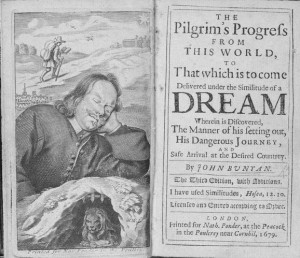 suffer the torments of despair. The answer is to trust in the promises of God, and return to the Way. We should remember that sometimes it takes a longer time to overcome our despair than Bunyan suggests in The Pilgrim’s Progress.
suffer the torments of despair. The answer is to trust in the promises of God, and return to the Way. We should remember that sometimes it takes a longer time to overcome our despair than Bunyan suggests in The Pilgrim’s Progress.
Conclusion
We have identified two views of depression that are fundamentally opposed to each other – the psycho-secular disease model of depression that has been constructed by the DSM, the bible of psychiatry, from its stance in secular humanism, and the biblical view which is based on the wisdom of Scripture. According to the psycho-secular view, people with a label of depression are ill and in need of treatment with antidepressant drugs and psychotherapy. The Christian counselling movement has simply accepted the psycho-secular disease model of depression at face value and is promoting it in the churches. As a result many Christians are being given a diagnosis of clinical depression and deceived into believing that antidepressant drugs and cognitive therapy are the answer for their troubled souls.
According to the biblical view, deep despair, walking in darkness and a downcast soul are most often ‘ordinary’ spiritual conditions, and the answer is always to trust the promises of God. It is the duty of God’s people to come alongside their fellow believers in their time of trouble and despair; to admonish, to support, to care for and mutually encourage one another.
In Psalm 143 David records how persecution had brought his soul very low: ‘He has crushed my life to the ground; he has made me dwell in darkness, like those who have long been dead. Therefore my spirit is overwhelmed within me; my heart within me is distressed’ (vv3-4). His remedy was to meditate on God’s past goodness to him: ‘I meditate on all Your works; I muse on the work of Your hands. I spread out my hands to You; my soul longs for You like a thirsty land. Answer me speedily, O Lord; my spirit fails! Do not hide Your face from me, lest I be like those who go down into the pit. Cause me to hear Your loving kindness in the morning, for in You do I trust; cause me to know the way in which I should walk, for I lift my soul to You’ (vv5-8).
The lifting up of downcast believers is the task of biblical ministry, but the adoption of secular therapies is wresting God’s people away from the only true and effective relief for their souls.
1 Stuart Burgess, The Origin of Man, Day One Publications, 2004, p108
2 Robert Reymond, A New Systematic Theology of the Christian Faith, Thomas Nelson Publishers, 2nd edition, 1998, p450
3 Mental health: A Report of the Surgeon General, Dr David Satcher, Overview of Mental Illness, U.S.
Department of Health and Human Services, National Institute of Mental Health, 1999
4 Ibid.
5 Ibid.
6 Earl Cooper, Pain of Mind: A Biblical Perspective of Depression, Author House, 1996, p98
7 Ibid. p109
8 Matthew Henry Commentary online
9 John Bunyan, Grace Abounding to the Chief of Sinners, para. 260, cited from Fearless Pilgrim by Faith Cook, Evangelical Press, 2008, p141
10 Evangelicals Now, ‘Depression: how churches and GPs can work together’, by Dr Mike Davies and Charles H. Whitworth, October 2008

